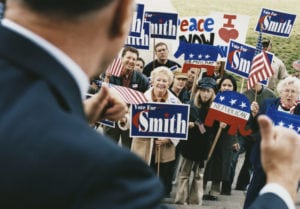 If the election merry-go-round makes your head spin, you can rely on your newspaper to help you keep things straight.
If the election merry-go-round makes your head spin, you can rely on your newspaper to help you keep things straight.
For decades, newspapers have gathered and analyzed information for voters at the local, state and federal levels. As elections and news consumption habits have changed, newspapers’ strategies for engaging voters have evolved.
Here are three ways that newspapers play a key role in election seasons:
1. Newspapers are part of the political conversation.
The tradition of newspaper endorsements is more than a century old. While some newspapers have never endorsed a political candidate as a matter of policy or stopped doing so, many continue the tradition.
To engage voters online and on social media, newspapers create interactive products, from a primary calendar to “debate bingo.” An example of an innovative project is the 2016 USA Today/Facebook Candidate Barometer. It maps conversations about the presidential candidates by showing total Facebook activity, such as likes, shares and mentions.
In addition, newspapers are involved in events where candidates speak directly to voters. The Des Moines Register held its Political Soapbox last month at the Iowa State Fair. (Burgers were not the only things grilled! Activists confronted presidential hopefuls with pointed questions.)
2. Newspapers use fact-checking journalism.
Newspapers fact-check claims made by candidates and their opponents throughout campaigns. The Washington Post fact-checked the Republican presidential debate Wednesday on CNN. The Washington Post Fact Checker posted a roundup of facts in the debate and tweeted cards that showed Pinocchio ratings for statements.
A study found that most Americans appreciate fact-checking, which helps them better understand issues. More than eight in 10 Americans have a favorable view of political fact-checking, according to the study conducted for the American Press Institute and released in April.
3. Newspapers reach the most active voters.
Persistent voters tend to be newspaper readers, research suggests. Of those who always vote in local elections, 27 percent are more likely to read the daily newspaper than the typical adult, according to research from Nielsen Scarborough released this year. Also in that group, seven in 10 read newspaper media in print, online or on mobile devices in a typical week, and nearly eight in 10 contribute money to political organizations.
Whether you are an active or occasional voter, you can turn to your newspaper for balanced and informative coverage on candidates and their answers (or antics).
*Members can download a print newspaper ad for the 2015-16 election season.
